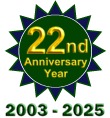|
MediaOptions
Founder Andrew Rosener has blazed an amazing trail
through the domain sales business, especially when you
consider that he is, by his own admission, a late
comer to the game. Escrow.com has named him the
#1 broker in the world (in terms of total $ volume
transacted on the platform) for five years in a
row. MediaOptions makes high end sales every week
but you rarely hear about them because the company
doesn't report them (Andrew details the reasons for
that in this article) but some still come to light when
revealed by other parties involved in the
transactions. In those cases Rosener will confirm if the reports
are accurate and those have included NFT.com
and Wise.com at $2 million each and Galaxy.com
at $1,761,000, to name a few from recent
years.
As far as
being late to the game, that is actually a point of pride
for Rosener, so much so that he thinks it may be the
single most important thing people know about him.
Why? "Because it proves it
is never too late to take advantage of the extraordinary
opportunities in this business," Rosener
said. Andrew added that his history is still something
that people get wrong when his name comes up on
Twitter. "I'm not one of the OG domainers,"
Rosener emphasized. "I'm not one of the pioneers like Rick Schwartz,
Kevin Ham, Garry Chernoff or
Scott Day.
That was the mid-90s,
not Frank Schilling
who
came next. Not from another generation that followed with
people like
Yoni
|
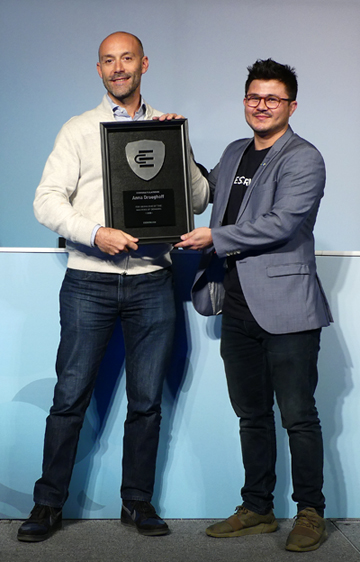
|
Andrew
Rosener (left) being honored by Escrow.com
at the 2018 NamesCon Global
conference in Las Vegas. The MediaOptions
founder has been named the world's #1 broker (in
total $ volume) on the Escrow.com platform the
past five years in a row with the fifth award
being announced at the NamesCon Global
2023 conference held in Austin,
Texas in June. |
|
Belousov, Merlin Kaufman and Daniel
Negari. I really was in a third or fourth wave of new domainers. I missed the entire
parking thing and even though the market was booming I didn't take advantage of
it because I didn't understand it."
|
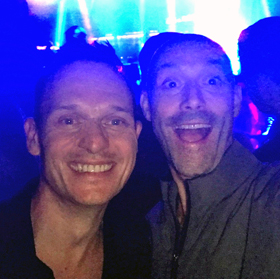
Andrew
Rosener (right) wih domain
industry pioneer Frank Schilling. |
"When
I came in here was nothing left to hand
register," Rosener continued. "The stuff that I had already in my portfolio really
didn't have much value. I didn't have any domain in that portfolio that was worth more than maybe five grand or 10 grand.
It took me working my way up from 2009 to 2012 before anybody would have
said I mattered in any way or had any degree of success. I came
in 10 to 12 years after the biggest players that we know today entered this
space and I was still able to build a business that's as successful or more successful than many
of them and I think that opportunity still exists
today. In fact, I think that there are more opportunities available today than there has ever been in the past."
Having
said that, Rosener has a deep respect and appreciation
for what the OGs accomplished in laying the
groundwork for the industry we have today. "I've seen
people say these guys got their domains 20, 30 years ago, and they paid nothing
|
|
for
them and there was no risk," Rosener said. " I think it's a shame when people discount foresight and discount how
hard it is to hold on to these assets and not sell them. How hard it is emotionally,
psychologically and sometimes even physically to think
I could use that money right now, but I'm going to forego it
and say no, because I know it's going to be worth more in the
future. I think that's actually the hardest part about the business." |
Now that you have a
general idea
about what Rosener has done, the questions still to
be answered are how he did it, who he is
and where he came from. In those decades before
he began streaking across the domain aftermarket sky like a
meteor, what
path did he follow that led him to, of all
places, the domain world? After hours of conversation with
Andrew for this story, we were able to put together a more
complete picture of one of the domain industry's biggest
movers and shakers.
Family
History
Normally when we
tell someone's life story we start from the day they were
born. In Andrew's case, the story starts before the United
States was even born! "I am a native New
Englander," Rosener began. "I'm from Rhode Island
and a descendent of the Cole family that is as old as Rhode Island
itself. The Coles and extensions of their family all are later generations of
Roger
Williams, who is the founder of Rhode Island
from its beginning as Rhode Island Plantation ih 1636.
I'm
a 14th generation descendant directly from Roger Williams. The oldest residential building in the
state of Rhode Island, built in 1731 (the year before
George Washington was born), is the Cole
Farm House, which is on the east side of Providence,
near Brown University. The original Cole farm was the entire east side of
Providence, so I guess I am as native a New Englander as it
gets."
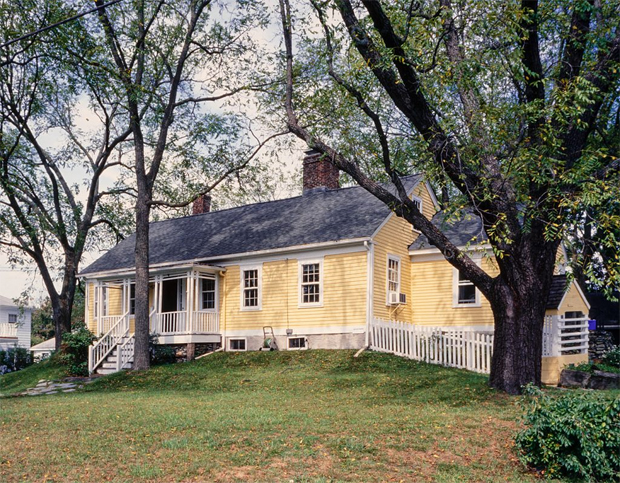
The historic
Cole Farm House built in 1731
Photo courtesy of the Providence
Preservation Society).
Despite that
heritage from the maternal side of his family, Rosener hastens
to add that he was not born with a silver spoon in his
mouth.
Over the generations the Cole land was split up and sold off.
"Absolutely everything that that family had was lost in the last three generations and primarily in the last two before
me," Andrew said. "The last relative with significant
holdings sold off the remaining parcels of land in a fire sale. He sold off all of the antiques, all of the important memorabilia,
everything. So we have very little of that heritage left, unfortunately."
The paternal side or
Rosener's family came from German roots with the owner
of a company that made tools for clock maker, Benjamin Block,
the first to migrate to the U.S. He settled in in New York
City where he eventually became a stockbroker and a Board
Member at the New York Stock Exchange. Block went on to
own racehorses, including Morvich, a thoroughbred that
won the 1922 Kentucky Derby dispute being a 50-1
long shot.
Things took a turn
for the worse in 1929 when the stock market crashed
though. Rosener
noted, "When the market collapsed Block was one of the very few
NYSE board members that did not kill themselves. Lucky for me, or I wouldn't be
here! But they did lose everything. Andrew's great
grandfather married Block's daughter and they sired his
grandfather Alfie who died when Andrew was just six
months old. "Alfie, who worked for Kaiser Aluminum and
had several patents under his name, fought in World War II and
led troops that freed the prisoners at Dachau,"
Rosener noted. "All that knew him said he was the most gentle, sweet,
well-mannered man. He would never speak about what he saw
during the war and died of a massive heart attack at 60 years old."
|
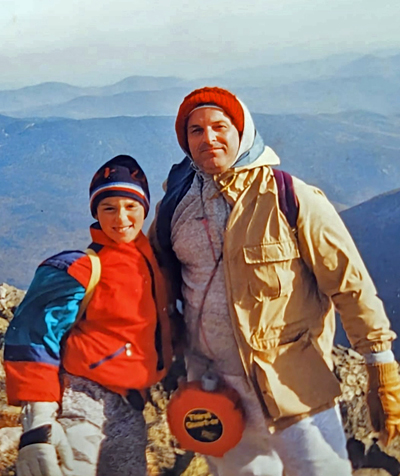
|
Andrew
Rosener (at left with his Dad) has scaled new
heights in the domain industry but it
looks like something he learned to do at at
early age. |
|
"I never got to know
my grandfather on the other side but I did have very close relationships with both
of my grandmothers who both settled in Rhode Island
where my father was born and raised.
My parents both went to the University of Rhode
Island, where I later went, and they both studied various forms of
horticulture and agriculture.
My mom went on to become a florist. My father went on to work for
Morse Shoe Company, then got into the logistics business, completely by accident, and spent
almost his entire career between Morse, Hasbro and
a Christmas tree company. He just retired two years ago.
My mother left the flower business to get a degree in
nursing but ended up in the healthcare field as a social
worker,
which followed the footsteps of her mother."
"I
was born in Providence but when I was four or
five we moved to Barrington where both of my
parents had grown up.
In Rhode Island, we have a saying - it's actually the university
slogan -
I'm Rhode |
|
Island born, I'm Rhode Island bred, and when I die, I'll be Rhode Island
dead.
And it's quite true. Very few people actually ever make it out of Rhode Island.
Nobody leaves. I don't know why, there's not a lot to offer, but people just don't leave.
Barrington is a very upper-class town but we were a very middle
to lower middle class family. All of our basic needs
were met but everything is relative so,
compared to others in Barrington I felt extraordinarily poor. I grew up feeling that I didn't have what all the other people around me had.
I couldn't do what all the other kids were doing and I couldn't go on the vacations that all the other kids were going on. I don't
wasn't to be overdramatic and say it was painful, but it was
a very powerful emotion for me and it became probably the largest driving factor in everything else that I've done in my
life." |
Combining
College with Commerce
"I did very well in school and I got accepted to the
University of Pennsylvania on wait list and wanted to go there
but wound up going University of Rhode Island because my parents said, look, we're going to give you your dad's car if you go to the
URI. If you want to go to UPenn you can do that, but it's on
you and you're going to be in a whole bunch of debt.
So I went to URI and in hindsight I think is fortunate that I
did. if I had gone to UPenn, I can say beyond any doubt that I would have ended up as some Wall Street douche,
a typical Wall Street banker, overworked, never satisfied, and a relatively boring life. And so I am extremely grateful to to my parents that they put that decision to me and that I chose what most people probably would have said would be the wrong decision.
Because I didn't have the opportunities that are inherent to graduating from
a school like
UPenn, I was, I think, more creative, more thinking outside the box and willing to accept, let's say,
non-standard options in my life."
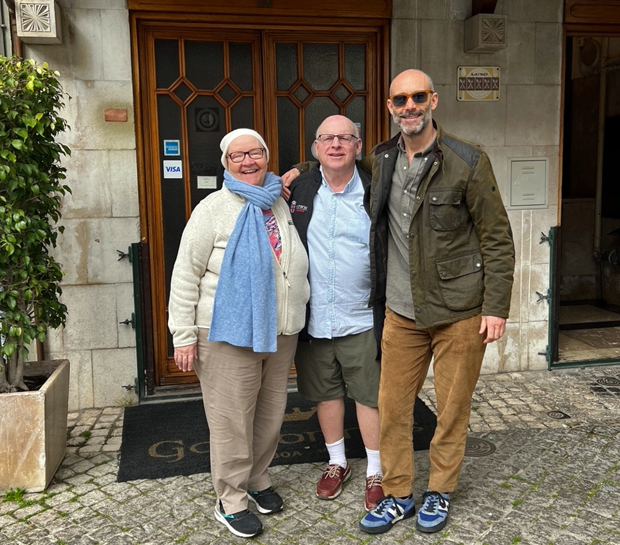
Andrew
with his a parents in Lisbon, Portugal where Andrew currently
lives.
"My
parents were very risk-averse and I wanted to do the opposite
- I was going to take risks, I was going to do whatever it was within my means to
do to be successful, whatever that meant.
I don't know that I had a very good definition of what that
meant but at the time it was just make enough money that
financial circumstances weren't going to dictate all of my life's decisions."
Rosener
began taking steps in that direction by joining a classmate to
start up his first business while still at URI. "I went
for a degree in management information systems (MIS), which was sort of a hybrid of a business education and a computer science
education," Rosener said. "This is the mid-90s and
someone had told me this new MIS degree led to the highest
paying job available at the time, so I said, all right, that's what I'm going to
do!
And then I got that education. And in my senior year, my friend
Parker and I started what was Phase II software, building
custom, very basic database software for blue collar businesses.
We built some successful software and made a little bit of money, good money for our age and peer
group, but really, the biggest takeaway was that this was not what I want to do with my life.
Funny enough, Parker now has his own company doing this, but at a
much larger scale and he's become quite successful with
it."
The
Phone Call That Changed His Life
"So,
I graduated with a degree in something that I never wanted to put to
use and I didn't know what I was going to do,"
Rosener recalled. That's when he got a phone call
that would change his life. " I got a call from this guy,
Peter Moehrke, and he said, "Hey, kid, I called your
university and I spoke to the dean. I told him I'm looking for somebody with an
entrepreneurial spirit that I can train to be a
mini me, because I want to retire three years from now. And I want to train somebody that's green behind the ears to come in to run this business,
not the way they think it should be run, but the way I want it to be
run.
I was told that you're the guy." Moehrke then
asked Rosener, "So, how do you feel about selling seafood?"
"I basically told him to
go pound sand!" Andrew
laughed, but then he said, "Well, look, I'll give you $1,000 to come and hang out with me for
a day and see what this is all about. We're not shoveling seafood. We're sitting in a nice little office in Newport, Rhode Island and we got a nice little business here, come and see."
|
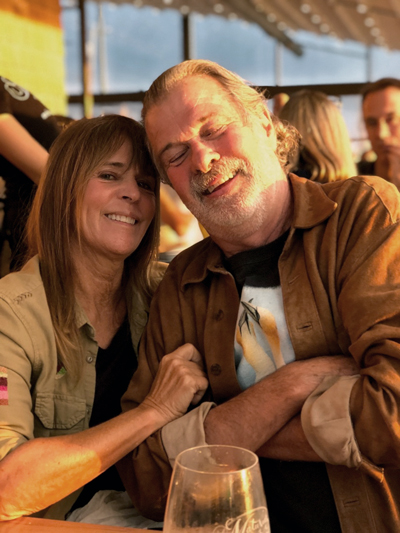
Omega
Seafood Founder Peter Moehrke
The mentor who made Andrew an offer
he could have refused but fortunately didnt! |
So
Rosener took the bait, put on a suit and tie, found a
briefcase to put his resume in and showed up at Moehrke's
Omega Seafood office on the Newport waterfront, right
across from the Trinity Church. Andrew described what happened
next with relish. "I go into the office and the secretary
points his door and says "go in". So, I open the
door and there is Peter Moehrke. He's got his feet up on his desk. He's got this Native
American stitched shirt on, he's got long hair and a ponytail
and he's got this funny beard. He is also literally blowing out a bong
hit! I just couldn't even believe my
eyes! So he looks at me, sort of looks me up and down, and he says,
"If you ever come in my office in a suit again, it'll be the last time you ever come in my
office!" And I thought, all right! You know, I could get along with this guy because I'm not fond
of pomp and circumstance. I proceeded to spend the day with
him and I found out this guy was brilliant. He was a Stanford guy. He was very smart, but he was an old hippie and
he was telling the truth - this was an interesting little business!"
|
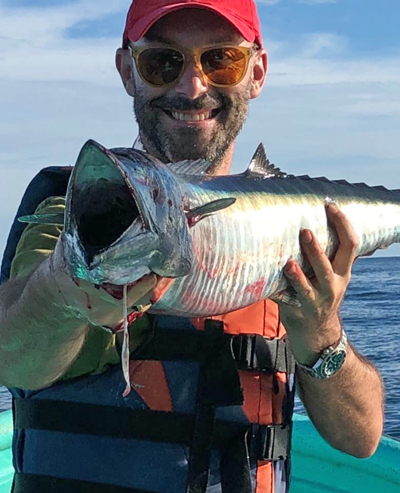
Rosener
took to sales like a fish takes to water. |
"I decided, OK, I'm going to at least give this guy
a shot and work for him for the summer. I did and was making maybe
$35,000 with an unlimited upside from sales commissions. It was very much a
sales job - and very much like my business
today. It is only through hindsight and the help of of a therapist
that I have come to understand that I've literally modeled my business after that business
because it was all I knew.
I spent the next three or four months working with this guy and very quickly realized that I was actually
quite good at it. I enjoyed the sales. I enjoyed calling people all over the United States and foreign countries and learning
things and it was interesting to me," Rosener
said.
"I've always had
a thick skin and didn't mind being told no or being called names
- it just didn't bother me.
It was almost a game. So I very quickly grew that business from a sales standpoint, from about
$8 million in revenue a year, |
|
where he was
making roughly $1 million in your profit, to $35
million at the time I left eight years later when
the company was making roughly $5 million in profit a year. Being in the seafood business was the
single most important and impactful thing that I have done in my life
hands
down," Andrew declared. |
While
thinking about the impact Moehrke made on his life and
business, Rosener's thoughts turned to another mentor from
earlier in his life who played a huge role in molding him into
the person he is today. "That was my wrestling coach in high school,
Wayne
Griffin, who's now in the Rhode Island Wrestling
Hall of Fame. "He's just an absolutely incredible, salt of
the earth human being that has had a tremendous impact on an
innumerable number of kids. He pushed us to the absolute limits of our
ability and made us want to challenge ourselves. He
taught us that pain is temporary, pride is forever.
That has stuck with me that, in those moments of real suffering, pain, challenging environments, it's really about your pride.
Without that, I there's zero chance I am who I am
today. Zero. It was that discipline and belief in oneself that he really created for me. Whether it's a teacher or a guidance counselor or a coach,
I think that's probably true
for many people who have found a high degree of success in their life."
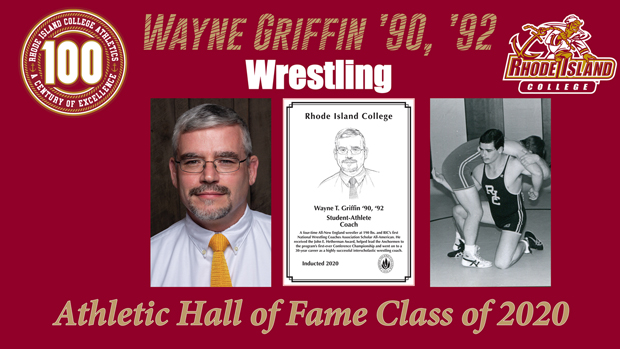
Sayonara Seafood! How Domains Reeled Rosener In
Armored
with a determined mindset and the razor shop sales chops he developed
in the seafood industry, Rosener was well prepared for the
next chapter of his business life. With the wide range of
directions he could have gone in, how, exactly, did domain
names rise to the top of his deck of career options?
"That
goes back to when I was in college," Rosener said. "I was
there just as the consumer internet was emerging, so we were learning about it. I remember taking a very basic class in HTML
and thinking you can put up a website and somebody, on the other side of the world can see what you've
posted! I just thought, Wow!, that is a powerful concept.
A professor said something about how it starts with a domain
name, you register a domain name, then you then build the
website, get a hosting account, post it live, and Voila!
But it all started with a domain name,"
Rosener said.
"I'm pretty
hyperactive, so every time I have an idea, which is several hundred times a day, I would
go get a domain name for that! It was incredible new technology and
I wanted to learn how to utilize it. I'm not insinuating that I knew
the domains themselves were going to be valuable and, frankly, the ones that I was registering at that time were
not valuable, but I got the concept, so I started registering domains every time I had an idea."
"After
college, while working for Omega Seafood and in
the seafood import/export business, I had visited Mallorca,
Spain with my now wife. While there I learned
about Iberico ham - a very special ham that at
the time was the most expensive meat in the world.
I tried it and thought, wow, this is the best tasting
thing I've ever had. Why don't we have this in
America? I'm going to start importing this! So I
registered these domain names thinking that I'm going
to do this as a side business, only to learn
that the ham was banned by the FDA. You were
not allowed to import this stuff into the U.S.!,"
Rosener recalled ruefully.
"So,
I basically forgot about it. Then, a couple of years
later, that I'm driving to my office listening to NPR
radio and I heard that President Bush was about to get
the first pot of Iberico ham ever imported into the
United States. And I thought, damn! So I
looked into it and found the importer in Virginia and
called him up. We had a great conversation and I
mentioned that I loved the ham so much I had
registered domain
|
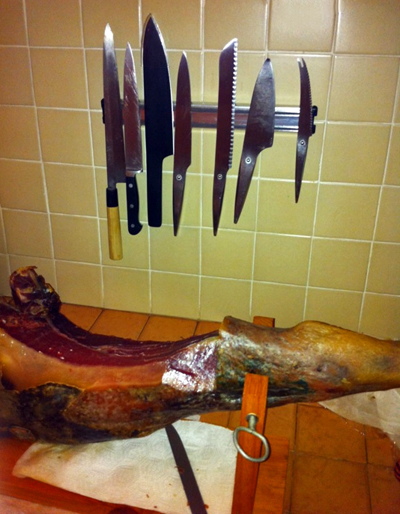
The
insanely expensive Iberico ham that convinced
Rosener domains could be very valuable assets. |
names
devoted to them and would really like to have some of the ham
to eat. He laughed me off saying, forget about it kid, the next
11 containers are all sold. You know, there's a one
year waiting list and, by the way, these were like $7,000
to $15,000 a leg! Still, the domain names I mentioned
intrigued him and he said "how much do you want"?
That was the first time that it ever crossed my mind
that these domains had value and that they could be
resold."
"I
didn't know what to ask for a domain name but I know what I
want - one of those hams! So I that's what I asked for and he
says done! That's was too easy, so I quickly
added "plus $5,000" and he immediately says done
again! Not only that, he ended up sending me all this great
wine, the holder for the ham and the kit of carving knives -
the whole caboodle! So now I knew undersold those
domain names, but it opened up my eyes that, if this guy in
this small niche market wants these domains, domains are
going to be really valuable in every market on earth.
That's when I decided it's time to back up the truck and start
filling it up with these things."
"Now,
I was still working full-time for the seafood business and
after work, spending maybe an hour or two a day trying to think of new domains to
register - but I was too late for that. Even so, I wasted a lot of money
hand registering a bunch of domain names, eventually accumulating
over 1,000 of them. So, one weekend while I was driving to
a friend's farm in upstate New York, I get a phone call from
GoDaddy. It is
Tess Diaz who was an executive accounts manager at
the time. She called to tell me she was part of this division
created to serve large portfolio holders and it was her job to
contact customers who had more than 1,000 domains and find
our who they are, what they are doing with their domains and
if there was any way she could help them. So me being the curious guy that I am, I just started asking
a million questions, keeping her on the phone for four or five hours
- a great way to spend the time on my way to the
farm!"
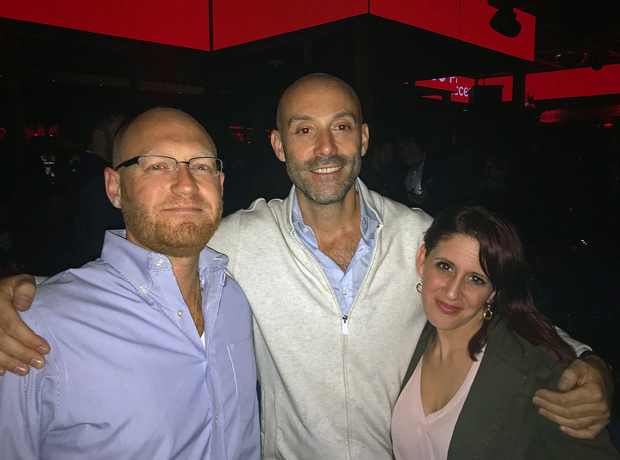
Tess
Diaz (right) schooled Andrew (center) on the ins and
outs of the domain business when she worked for GoDaddy.
Andrew later hired her to work on DomainSherpa. At left
is Andrew's right hand man for the past decade, MediaOptions
Head of Sales and
Marketing Chris Zuiker, who Rosener credits for helping
propel the company to heights few could have imagined when the
new brokerage launched.
"So I'm just asking away and
Tess is telling me all these stories and introducing me to all
of the characters who I now know, and some that I call friends, that made up the domain industry at that
point and it just blew my mind! I didn't even know that there was a domain industry. I didn't know that there was an aftermarket.
I didn't know that there were auctions. I didn't know there was expiries.
I didn't know that there was forums. I didn't know that there were
blogs.
I didn't know any of this! And so she sent
me links to DNJournal.com, DNForum.com and Andrew Allemann's
blog (DomainNameWire.com) along with other resources I should
check out, including, of course, GoDaddy Expired Auctions."
"That
is when I went down the rabbit hole of, wow, look at this gold mine of expired
domains!
I probably bought another couple thousand domains.
It was really only at that point and through working with Tess,
who was very patient helpful with me, that I began to understand
what actually made a domain valuable. I realized I'd
probably thrown $300,000 in the toilet and it was basically
time to start all over again but with new standards and new
tools. The thing is, I don't regret that at all. You know, it was an
education and I call it tuition to domain college, We've all paid it, but maybe not as
much!," Rosener smiled.
"Still,
I had essentially run out of money. I knew domain were a good business opportunity, but it was very
cash intensive and I needed a way to create sufficient cash flow to support
my comeback. So, in 2007 I started brokering domain names kind of
informally. Then in 2008, I quit my job at Omega Seafood and went
full time into domain brokering. My wife, Anna,
and I moved to Panama at the end of 2008 and spent 10 years there, had
two children, and then, five years ago, moved to Portugal."
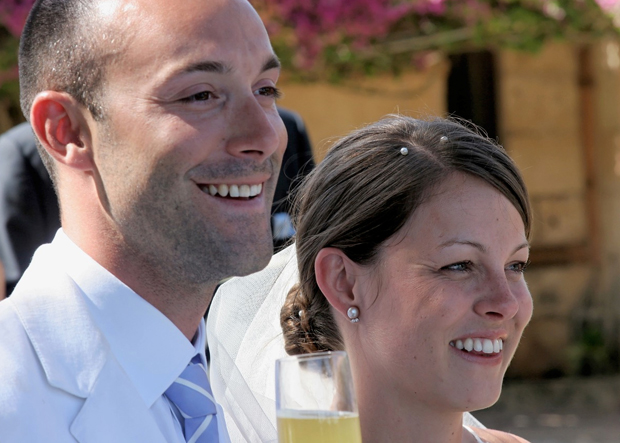
Andrew
and Anna Rosener at their 2005 wedding.
Rosener
added, "Most who read this will remember that at the end of
2008 the world seemed to be going to hell in a handbasket. Friends and relatives were losing jobs and you couldn't turn on the news without shedding a tear. It was
just a mess and as an inherent optimist I had had
enough. I got rid of my television and I've never owned
one since. I stopped watching the news because I don't want this pessimism
around me. Of course, everyone still thought I was insane
for quitting my job
in this environment. I was 28 years old and I was making
$300,000- $400,000 a year at Omega, which in my peer group,
was a lot of money, so, my parents were in tears. How could you possibly give up such a job and go and do something you have no idea if it's going to work?"
"Number
one, the crisis made the downside risk seem less to me. Number two, I had gotten
married in and my wife had given me a time limit on how long she wanted to live in America.
Anna is German but she said I'm willing to do four years in the US and then it's time to go.
Plus, it was an asymmetric opportunity and I think that if there
is an underlying theme in my life that has led to my success in everything I've done,
it can be attributed to the absolute certainty that I will take
any asymmetric risk presented to me that has an
asymmetric upside versus the downside.
If I see a tremendous opportunity and my downside is to some degree limited, I will take that chance every single time purely on the probabilistic math."
"To
be fair, there was also a change internally at my company. My mentor and to this day, very close friend, Peter
Moehrke, had a son who had just graduated from college. He had come into the
business and he was clearly not falling in the footsteps of his father.
It also became apparent to me
that Peter's ambition would ultimately be that his son would take over this business and that flew in the the face of
my ambition, which was that I was going to take over this
business or at least become a partner in it. So that was quite a big
factor in shifting my perspective from building a lifetime career in
that business. There was a fork in the road that became clear to me, probably a year before leaving,
so that also helped to lubricate the decision making."
Making
Waves With MediaOptions
You
know the old saying - when one door closes, another
one opens - well, walking through the door that led to
Rosener's creation of MediaOptions has proven many
times over that he made the right decision. So, what
skill set and strategy enabled him to take the company
to the heights it now enjoys?
"It's a great
question and it's something that I often reflect on to this day and have for many
years, Andrew said. "First and foremost is I enjoy sales and I'm good at
sales. Many people, probably most people, get uncomfortable with sales.
They don't like being told no, they get offended when people
get mad at them or say mean things to them. I just don't get offended very easily by almost anything.
Sales is really all I know. It's all I've ever done.
It really doesn't matter what the business is. It is about understanding how to read people, how to understand what motivates
people and what demotivates people and an ability to meet people
where they are as opposed to trying to get them to meet you where you are."
|
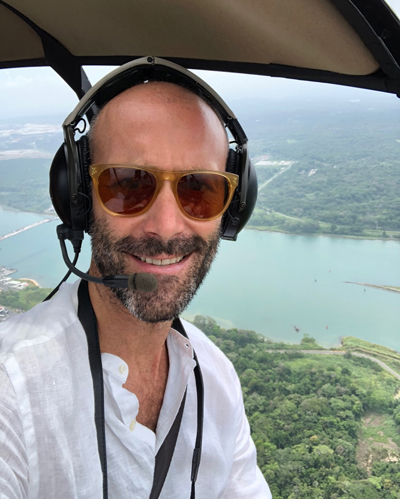
Andrew
Rosener gave us a high level view
of what it took to build MediaOptions into
a domain brokerage powerhouse. |
"I think that the next most important factor was I have always had a really strong curiosity and interest in the concept of
value and price versus value. How do you establish value?
Why is something worth what it's worth? Is it just just because
people agree on it or are there inherent factors?
That was something glaring to me about domain names. I would speak to all these people, even the really smart
ones, and it seemed like the pricing of their domains was totally
arbitrary.
It was like, I would like to have another beach house and that's
going to cost me a million bucks, so the price for this domain is a million
bucks. My wife wants a pink Cadillac, and that's going to cost me 60 grand. So this domain is 60
grand! I know it seems so silly, but I'm telling you this firsthand, this isn't made
up!," Rosener said with exasperation.
"That is how people were
pricing domains so I wanted to better understand.
What were the actual inherent factors that were driving the value of
domains? I spent a lot of time studying DNJournal's
sales report and every single domain in it. I would go and analyze who bought it, try to understand why did they buy it, why did it sell for what it sold for, and what I very quickly
understood was the names were selling for totally arbitrary
prices. There were very few domains that were selling for an objective
value. It was really the buyer setting the price, not the seller.
So, I really wanted to figure out a framework because if I'm going to proactively sell domain names, then I need to have a framework to to
justify that value, otherwise I might as well be selling vacuum cleaners.
When even the people in the industry don't know how to justify
the value of a domain, how can I expect the business leaders who are making
purchase decisions to understand what the value is? I needed to be able to translate that value into something that they
understand. A way to break down what a domain name is, why
they exist and what's the purpose of it at a at a fundamental level."
|
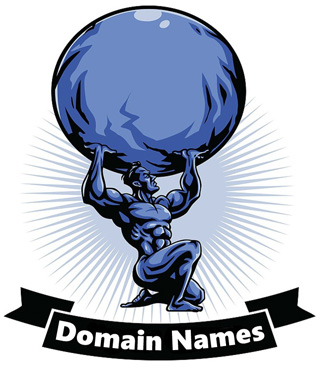
Image
from Bigstock |
"So. I explain that
It is a way to remove friction between a visitor or a consumer and the destination that has what they're looking for on the internet.
And the advantage or disadvantage of a given domain name is its
ease of use, which is how short is the domain and how easy is it to spell.
And its memorability, which is its ability to be remembered if you see it, to pass it on through word-of-mouth marketing, which is the most powerful kind there
is. If we take that the fundamental reason for domains to exist
is to get somebody in the easiest way possible from point A to point B, then what makes a particular domain best suited for that
purpose?
That was sort of the breakthrough. I was like, okay, the easiest way to get somebody from,
say, " I want to buy a bicycle online" to
" here's the bicycle for you to purchase" is probably
bike.com, bikes.com, bicycle.com,
bicycles.com in that order. So what made bike.com more valuable than bicycles.com? Why was this the best domain for that given purpose?"
That's when I discovered Google Search Volume and I started applying a lot of
what I had learned." |
"It really all came down to basically
the same way that anybody in the private equity business,
venture capital business or M&A business values a
company. It's what's the total addressable market?
How much of that market can you realistically and probabilistically expect to capture and why, and what will it cost you to capture that portion of the market?
That translates into domain names through what's the total adjustable market,
how many people are searching for a given keyword phrase or acronym every month,
how many people are searching for that in YouTube, how many people are using that keyword acronym phrase in a
hashtag on social media. How many trademarks have been
registered that are used in commerce. Then, use in culture is the social media aspect and
it's how many social media handles and some of the less commercial things that you can search for.
Then what the cost per click is, what is it going to cost you to capture that market share?"
"You
can then extrapolate that out using general business best practices, which is, what's the standard business multiple that an M&A guy is going to look at from private equity?
He's going to pay 3 to 5 years. So using some of these really basic general business
principles, but taking their domain name proxy was what ultimately allowed me to start formulating a really data-driven objective approach to
valuation. I think that my early understanding of domain value and my absolute belief that domains are
worth that objective value produces a value baseline that you can have an extraordinarily high degree of confidence in.
Because I can justify it, I can tell any company on any domain
name how this domain name is going to decrease their cost of customer acquisition or visitor acquisition or whatever it is their objective is.
We can demonstrate that beyond any doubt,"
Rosener said, concluding "I think that was the biggest thing
that set me apart while everybody else was still sort of licking their finger and putting their finger up in the wind to see which way the wind is blowing."
|
Rosener's
rise has also been fueled by an extraordinary work ethic.
Rosener recalled, "The first 10 years of Media Options, a slow day was 14
hours and most days were 16 to 18 hours - and that was
six
days a week at least and it didn't matter where I was,
didn't matter what time of the day, I never shut my phone off.
I picked up every call, I responded to every email. It was
just relentless." Now
that he has children, Rosener allows that his schedule has
been adjusted to create some priceless family time. Which brings us
to Andrew's secret weapon - his wife Anna.
"Anna
was absolutely my 50-50 partner in building this business.
She is the yin to my yang in the sense that I have a really high propensity for
risk taking and she has a very low propensity for risk taking.
She is okay to take risks, but it has to be very calculated and
understood.
She preserved me from self-destructing. That's really what I would say
is the most important thing.
|
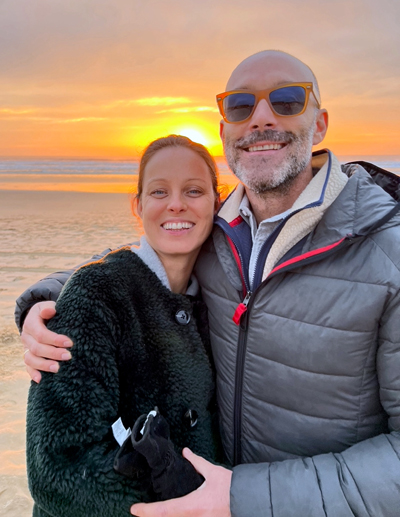
Andrew
and Anna became made an unbeatable team. |
|
She played a very active role in the business, particularly in that first two iterations of the business,
the first decade.
It was really the grounding that she gave me. That kept me from self-destructing. And there were several instances where I could have easily self-destructed, but she gave me that grounding and
support needed to keep it going." |
Rosnener
Buys and Reboots DomainSherpa
With
all of the balls Rosener has in the air, it is easy to forget
that MediaOptions has not been his only enterprise. He has
also tried his hand at domain development and that is a
story with valuable lessons of its own, so we will save that
for separate article down the line. He has also been very
active in the cryptocurrency/NFT space and again, that
merits a separate post of its own. However, Rosener's best
known extra-curricular activity, DomainSherpa.com,
is so intertwined with him and his passion for the domain
industry that it has to be ipart of his personal story.
|

|
As
most know, Michael Cyger founded the video interview
site in 2011. Andrew Rosener bought the site from Michael in
2017. Andrew recalls how the acquisition came about.
"When Michael contacted me and told me that he was going to retire from DomainSherpa
and was going to |
|
sell it, I had a lot of mixed feelings,"
Rosener said. "I had been the most frequent guest on the show and I'd spent an incredible amount of time doing those interviews with Michael.
I didn't feel comfortable with anybody else owning that
content. Frankly I didn't really want to run the thing but
felt I needed to buy it because I don't want somebody else having it.
Once I owned it, everything worked out though. There was a lot of
positive community feedback expressing a desire to see
DomainSherpa keep running, so we tried to figure out a model that would work for
us and we tried to follow Michael's format the best we could." |
|
"I don't think we did a great job of doing that, to be honest, but I think
we carried the torch to the extent we could. Then when
Jonathan Tenenbaum came aboard Media Options, he was the perfect host and he loves
it. He made it fun again and really entertaining, sometimes
too entertaining!," Andrew laughed. "It also got me
reinvigorated and excited about it. So, with the help of a
few key sponsors like Dan.com and Network Solutions,
and probably some I'm missing that'll get mad at me, we were able to say, all right, we can turn this into something that will be
self sufficient. To be absolutely clear, this is not something that makes
money though. Even with |
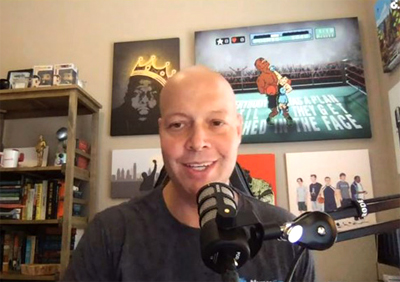
Jonathan
Tenenbaum
The personable and popular host of DomainSherpa.com |
|
our sponsors, I'm sure
if I dug into the numbers, we're probably still underwriting it. But it is
something that I think is really, really important.
And it's really important to me. I didn't know it at the
time but I
think It's going to end up being the most important thing I did in the domain
space. I say that because I think that it represents, along with DNJournal, along with
DNAcademy, along with DomainNameWire and very few other publications or educational sources,
it's probably the broadest knowledge base about the domain industry that exists on this planet." |
"We have this nascent industry
of not more than a few hundred real full-time active successful people in this industry that can say
I've built a career here, this is what I do with my
life.
I think we've covered most of those people. They've had a voice on DomainSherpa. They've told their story on DomainSherpa. They've talked about their tips and tricks. They've talked
about their approach to the domain market, how they make money in domains.. I think
that knowledge base is what allows new people to come into the
industry and
not have to take the lumps. I think that if we're going to grow as an industry, which is my ambition,
you have to grow the pie. The way I'm going to become extremely successful in this business, beyond anything I've done yet, is by growing the
pie."
Andrew
added, "I think that domain names in my lifetime, in the next 20 years, hopefully sooner, will be recognized as the
commercial real estate of the digital economy. In the last 150
years we were in a physical economy that was governed by proximity, real
estate and that idiom of location, location, location, meant everything.
And in a world where nothing is proximate and everything is accessible,
your domain name is that proximity. So I think domain names are that commercial real estate 2.0. It's not just an analogy. I think it's fundamentally a
truth. I think that you will in the future see internet real estate investment trusts, you'll see large funds owning portfolios of domain names that generate income through leases, lending, and all different sorts of stuff that these types of entities do in the commercial real estate market. And that's my hope is to help us get there and then benefit from that level of adoption and the price appreciation that will come with that.
That's my hope.
And I think DomainSherpa is the way that I can express that and do my part in achieving
it."
Domain
Sales: Publicize or Privatize?
|
Now
let's circle back to something I mentioned in the first
paragraph of this article - a topic that Andrew wanted to
address. "A lot of people get really upset because we don't disclose our domain
sales," Rosener noted. "The reason is I don't believe that these sales are mine to
publicize. I think that I am a facilitator of a transaction. And that transaction is between a buyer and a seller and it's
their right, not mine. Also, I think that the confidentiality that we are known for is one of the most attractive things that drives some of the really important VIP clients that we have to us.
I do see the value in publicized sales, of course. As I said to you, I probably wouldn't be here today if it wasn't for analyzing
DNJournal's domain sales reports.
But, that being said, confidentiality, |

Image
from Bigstock |
|
at least
to our business, is absolutely essential. I do wish, to some extent, I could publicize the sales because I think that it would really
change people's perspective on domains. We are selling domains in the seven figures basically on a
weekly basis, maybe bi-weekly in some cases, but there's rarely a month in which we don't have one or two seven figure sales and we're selling several eight figure domain names per year.
Domains are great domains are incredibly valuable. And they're not going to go down in value, in my opinion, anytime soon." |
"So I think it's important for the domain industry to recognize that we are sitting on
incredibly powerful and valuable assets and that we shouldn't be
underselling ourselves and that we shouldn't be getting overly excited about a lot of the sales that get
published.
I see this in the people that hire us to go acquire a domain for them
when they say, look, this, guy was excited about a $100,000 sale, he'll take 100 grand, right?
Even if these guys were willing to pay a million.
Anybody that needs to sell, I don't discourage that at all. But if you don't need to sell, I would encourage you to really think deeply about what
your domains are worth, both to you and to the perfect end user, and then take a long-term time horizon
as opposed to a short term time horizon and just feel confident."
Misconceptions
& Wise Words
I'm
going close with a final question I had that stemmed from an
offhand comment Andrew made when I first started talking with
him about doing this story. He mentioned that it might clear
up some misconceptions people had about him. Having
known him since he entered the business, I wasn't sure what he
thought those might be, so no better time to find out than
now!
|
"Just
a couple of points that I think I observe," Andrew began.
"One of them is quite simple - I think a lot of people think I'm,
for lack of a better word, an asshole. I think that the people that are really close to me and
talk to me regularly would understand that I am jaded. I
guess, highly jaded because. whether it was in the seafood business or in this business,
I spend all day, every day talking to a lot of people, being told basically to go pound sand in every imaginable way that anybody has ever said it.
I've learned a lot about people and that has, unfortunately,
caused me to be very jaded and to maybe expect the worst from people and hope for the best.
The lesson that I've learned from all of it is that I have a very low tolerance
for BS. I don't know what else to say, so I'm very straight to the point and I'm very
direct.
I think that gets misconstrued as me being an asshole." |
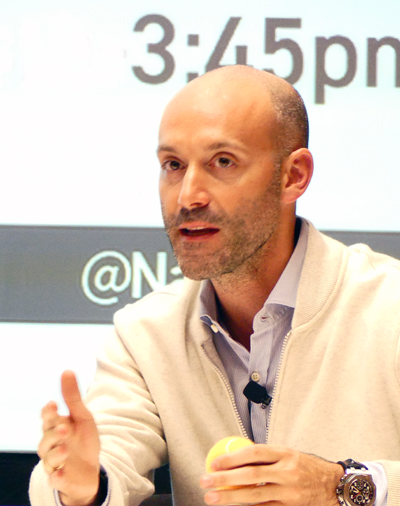
|
"Sometimes
the advice I give is callous, sometimes it's cold and direct and I might just fire off an email to somebody that sends me a list of domains and I say,
this is crap. There's nothing here of value, try again. Go watch DomainSherpa. I mean that
constructively. It
is the kind of feedback that I got that helped me to build my
business - immediate, tough feedback that allowed me to build the thick skin that is absolutely required if you want to have any degree of success in almost anything.
It seems to me that everybody kind of portrays me as being a real tough guy
asshole and I don't think that's who I am."
"In
any case, I think people should really focus on learning, hard work, and trying to emulate what
others are doing - people that they relate to. Not everybody's going to relate to me.
I don't consider anybody competition because there are more domains to be sold than there will ever be domain brokers or hours in the day for all of the domain brokers to sell them.
Yes, I'm an extraordinarily competitive person, but this is a big
market and it's only going to get bigger. There's not enough tools
or enough people to fulfill the opportunity that the domain industry has over the coming decade.
So, don't waste too much time on forums.
Don't waste too much time on Twitter.
Don't worry about what other people say. Just ignore it.
Ignore the noise. Focus on what has value.
Focus on the people who have proven track records, who have demonstrated
success - and above all - don't believe that the opportunities
are gone or that the only ones having great success in this business started 20, 30 years
ago. That's not true at all and I think that we
have yet to see the biggest successes in this industry
- we probably don't even know their names yet!
*****

|

